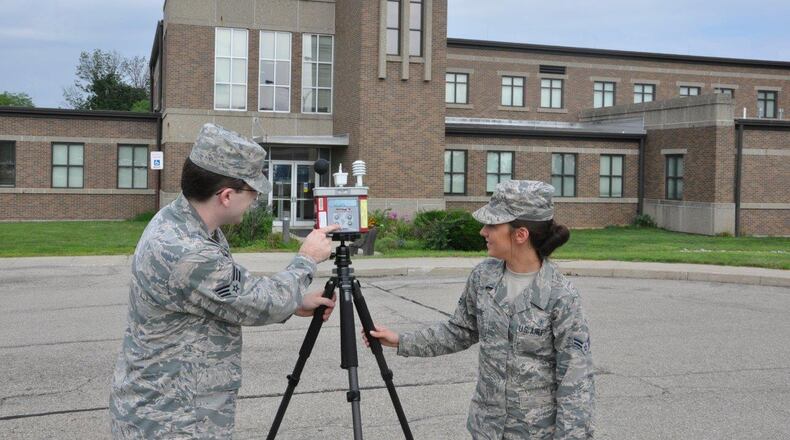“Wet bulb globe temperature is a three-part outdoor measuring instrument that records black globe ‘the temperature standing in the sun;’ wet bulb filled with distilled water ‘measures humidity by how fast water evaporates;’ and dry bulb which tracks the ambient ‘surrounding’ temperature,” said Senior Airman Alex Shuttleworth, Bioenvironmental Engineering journeyman, located in Area B, Building 675.
These three recordings provide the wet bulb globe temperature, which is somewhat different than the actual outdoor temperature. With all three readings, the heat load on the human body can be measured. This is extremely important when working outdoors to prevent heat stroke and other heat stress-related illnesses.
According to AFI 48-151 THERMAL INJURY PREVENTION PROGRAM there are four heat guidelines for average acclimatized individuals: green, yellow, red and black. For example, for yellow with a WBGT reading of 85 to 87.9 with easy work there is not a rest cycle, but easy work in this range still requires a person to drink at least 24 ounces of water per hour. With moderate work a person will need to take a 10-minute break after 50 minutes of work. Hard work requires 30 minutes of work and 30 minutes of rest. A person will need to drink at least one quart of water per hour with moderate and hard work. A reading of greater than 90 WBGT in the black zone would be 10 minutes of work with 50 minutes of rest and at least one quart of water per hour. Work during the black zone would be best to avoid.
Shuttleworth or Airman 1st Class Taylor Osborne, Bioenvironmental Engineering apprentice, will take the wet bulb instrument outside in the morning close to 9 a.m. and start recording the readings. Wet bulb will stay outdoors until 4 or 4:30 p.m. when they finish their readings for the day.
This information can be found on the Bioenvironmental Engineering SharePoint or follow Bioenvironmental Engineering on Twitter @Heat_Cold Alert.
Paying close attention to these WBGT readings will help anyone with preventing heat stroke and any other health issue related to heat and humidity.
“Always make sure to drink plenty of water when working outdoors,” said Shuttleworth.
For additional information, call Bioenvironmental Engineering at 937-255-6815.
Caption: Senior Airman Alex Shuttleworth, Bioenvironmental Engineering journeyman, and Airman 1st Class Taylor Osborne, Bioenvironmental Engineering apprentice, are reading data from the Wet Bulb Globe Temperature measuring instrument July 14 near Bldg. 675, Area B, Wright-Patterson Air Force Base. (U.S. Air Force photo/W. Eugene Barnett Jr.)
About the Author
